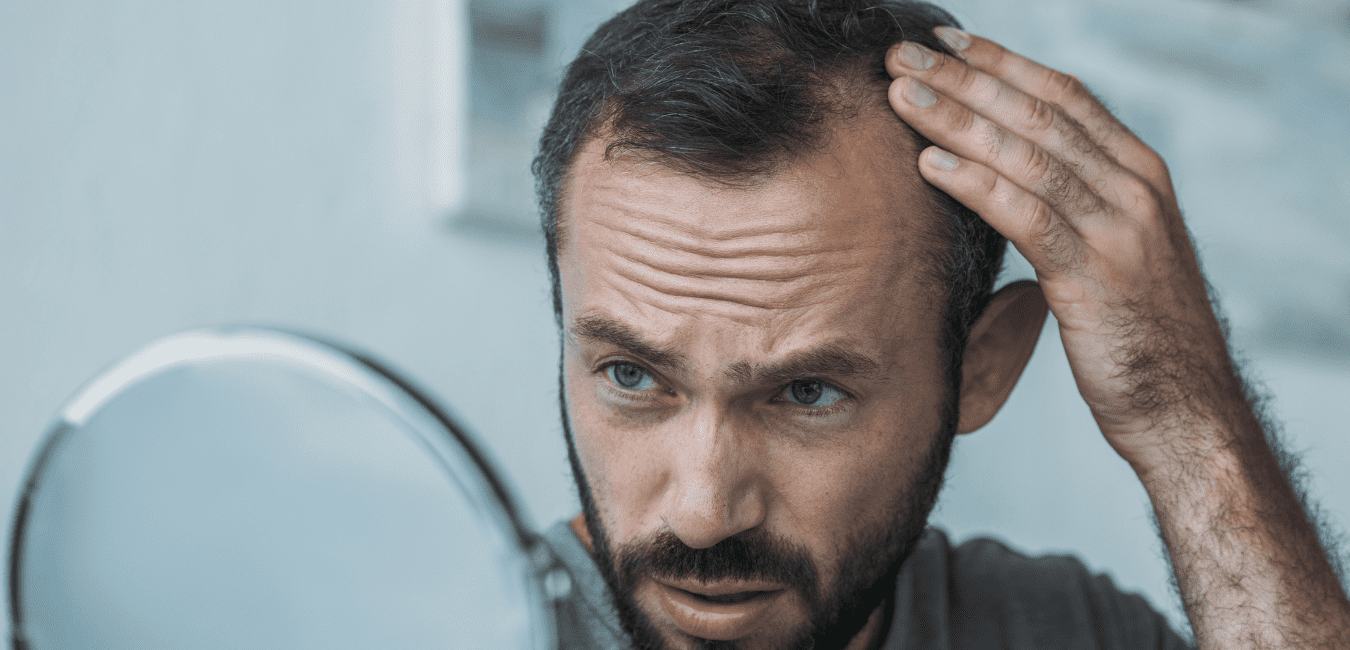
Some people believe that nootropics can also cause hair loss, but there is no scientific evidence to support this claim. In fact, some research suggests that nootropics may even help protect against hair loss.
In this article, I'll go over what the data says about how likely they are to cause hair loss and some potential remedies for this side effect.
So without further ado, let's just get straight into it, shall we?
Nootropics & Their Effects On Male Pattern Baldness
When it comes to hair loss, there are two types of baldness: male pattern baldness (MPB), or androgenic alopecia, and female pattern baldness.
Male pattern baldness is caused by a hormone called dihydrotestosterone (DHT), which can shrink hair follicles until they eventually disappear.
This type of baldness usually starts with a receding hairline and then progresses to a bald patch in the crown area.
Some studies have shown that some nootropics (like L-theanine) can increase DHT levels, which could theoretically lead to hair loss.
However, other studies have shown that some nootropic users that take Pumpkin Seed Oil actually have lower levels of DHT than people who don't take it.
Combine that with studies showing that some nootropics like Pumpkin Seed Oil can protect against high levels of DHT, and it becomes pretty unlikely that they'd cause hair loss on their own.

But what about female pattern baldness?
Unfortunately, there are no data available on whether or not nootropics increase the risk of female pattern baldness.
What we do know, however, is that female pattern baldness is caused by a different hormone (estrogen) than male pattern baldness, so the effects of nootropics may be different.
Can Nootropics Promote Hair Growth?
When it comes to hair growth and hair follicles, there are a few different things that need to happen:
- The hair follicles need to be healthy and functioning
- The scalp needs to be free of inflammation or infection
- New hair follicles need to form
- The hair shafts need to be strong
Some research suggests that nootropics may help with 1, 2, and 3.
For example, one study found that ashwagandha could help prevent and promote hair growth.
This was a small study, but they found a noticeable reduction in scalp hair loss.
They also found that the number of new hair follicles increased, and the shafts of the hair became stronger.
While this study is promising, more research is needed to confirm these findings.
Can Nootropics Reduce Hair Loss?
One of the main reasons people take nootropics is to reduce stress, anxiety and become more productive.
As we all know, chronic stress can cause a number of health problems that affect our minds and bodies.
However, some studies have shown that high levels of the stress hormone cortisol can also cause hair loss.
Cortisol, a stress hormone, has been found to influence the hair follicle's functionality and cyclic regulation.
Cortisol's presence at excessively high levels has been linked to a 40 percent reduction in the synthesis and a 40 percent faster degradation of critical skin components, such as hyaluronan and proteoglycans.
In other words, when we're constantly stressed, our bodies produce more cortisol which can lead to a loss in hair density/thinning hair.
Smart Drugs like Ashwagandha and Rhodiola Rosea have been shown to combat hair loss by reducing cortisol levels.
However, more research is needed in this area.
Are Nootropics Too Risky For Balding People?
Hair thinning and healthy hair growth are complex topics with no easy answers.
At this point, there isn't enough evidence to say for sure whether or not nootropics can cause hair loss or accelerate hair loss in people who are already balding.
What we do know is that cognitive enhancers have the potential to help with hair growth by reducing stress and inflammation, and thus indirectly improve scalp health.
If you're worried about hair loss, it's best to talk to your doctor before consuming any pharmaceutical drugs (like finasteride) or hair loss supplements.
They can help you figure out if there's a specific cause for your hair loss and recommend the best course of action.
If you're looking for hair loss supplements and nootropics that have the potential to help with hair growth and hair loss here's a shortlist of the most popular with scientific evidence available:
- Finasteride
- Minoxidil
- Green tea (EGCG is an active ingredient that shows promising results in not just mental health but also hair loss prevention)
- Essential nutrients like vitamins A, C, D, B, E, and zinc
- Hair growth supplements like biotin
Nootropic Supplement That Helps With Hair Growth
As briefly mentioned above, ashwagandha is a nootropic that has been shown to help with hair growth.
Ashwagandha is an adaptogen, meaning it helps the body deal with stress.
It's one of the most popular and well-researched nootropics for a reason - it has a lot of benefits for the mind and body.
Other nootropics like pumpkin seed oil, lion's mane mushroom, and Rhodiola Rosea also show potential for hair growth.
A study looked at the effects of Pumpkin Seed Oil on hair growth in men with Androgenetic Alopecia and found that the oil was able to improve hair growth in a majority of participants.
Lion's Mane Mushroom is being studied for its potential to treat alopecia areata, and preliminary research suggests that it could be helpful.
Rhodiola Rosea is an adaptogen that has been shown to help with stress and fatigue.
It has also been shown to have benefits for the hair, including increased hair growth and decreased hair loss.
These are just a few examples - there are many nootropics that show potential for hair loss prevention.
Does Alcar (Acetyl-L-Carnitine) Promote Hair Shedding?
Alcar has been shown to be effective for stress-related anxiety, depression, and fatigue.
However, it's unknown whether or not Alcar helps with hair loss.
What we do know is that L-Carnitine (a type of amino acid found in alcar) can help reduce cortisol levels which can lead to decreased hair shedding/hair loss.
More research is needed on the effects of alcar specifically for men with genetic predispositions to Androgenetic Alopecia (male pattern baldness).
One study showed that men who applied an L-carnitine solution twice daily for 6 months increased hair on the scalp in people with male or female pattern hair loss.
BDNF May Be Helpful For Hair Loss
Some studies show that BDNF (Brain-Derived Neurotrophic Factor) may help with hair growth by increasing the survival rate of hair follicles.
BDNF and its high-affinity receptor tyrosine kinase B (TrkB) are critical for hair follicle cycling control.
Studies in humans suggest that BDNF treatment may promote hair growth by stimulating the anagen phase of the hair cycle.
Some nootropics that may increase BDNF levels and promote hair growth include:
- Ashwagandha
- Bacopa monnieri
- L-theanine
- Green tea (EGCG)
- Ginseng
- Nicotine
Nicotine is something that most people wouldn't think of as a nootropic, but it actually has some cognitive benefits.
One study showed that nicotine affected the expression of BDNF in animals.
It's not clear if nicotine has the same effect in humans, but it's something that should be investigated.
Ginseng is a well-known adaptogen that has been used for centuries for its medicinal properties.
One study showed that Ginseng was able to increase the expression of BDNF in the hippocampus of patients.
This is significant because the hippocampus is responsible for memory and learning.
The study also showed that ginseng was able to protect neurons from damage.
X-Factors: Lifestyle and Genetics
When we're talking about hair loss, it's important to remember that hair loss is a complex process involving many different factors.
While taking nootropics may reduce the effects of some of these factors, you can't fight genetics.
No matter how successful the drug is at promoting hair growth (or preventing hair loss) when your hereditary propensity is for hair loss, you are likely to encounter it at some point in your life.
Lifestyle choices are also important - things like stress, diet, and sleep can all play a role in hair health.
There's no one "magic bullet" when it comes to hair loss prevention. Even the surgical methods for coping with hair loss have minimal success rates.
The best approach is to accept that hair loss is a part of life, and take steps to reduce the stress in your life, make healthy choices, and supplement your diet with nootropics that have been shown to be helpful for hair health.
source https://nootropicology.com/nootropics-and-hair-loss/

No comments:
Post a Comment